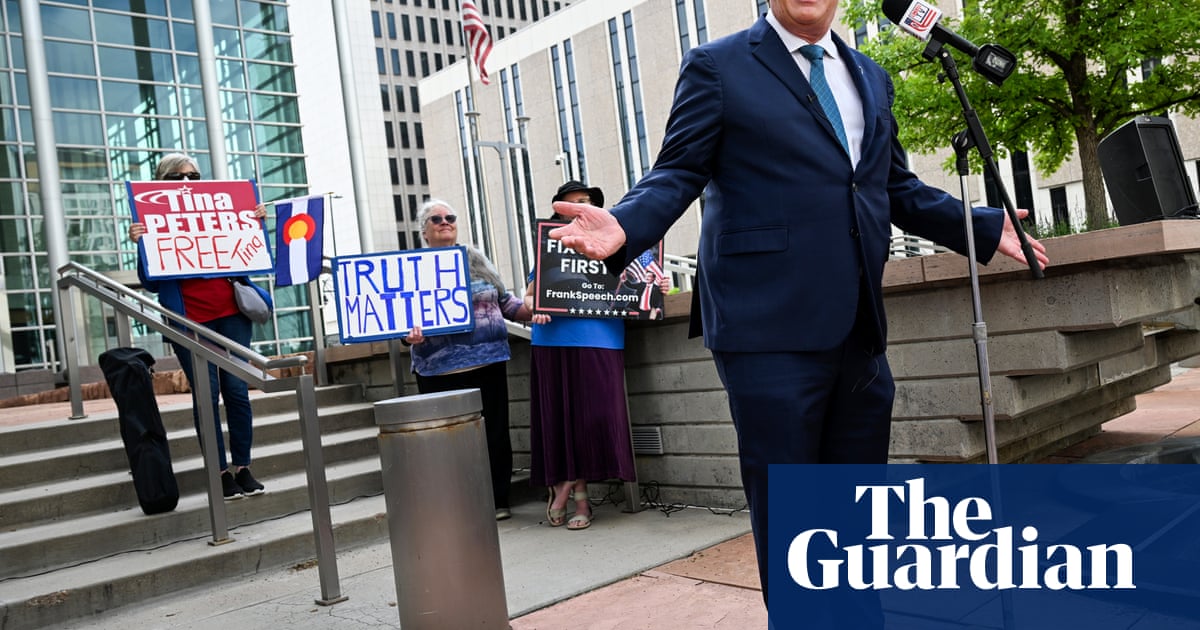A trial underway in Colorado could add to the financial problems facing the pillow salesman and prominent election denierMike Lindelland will serve as another test of whether defamation law can be effective to fight false claims about elections.
Opening statements began Tuesday in a case brought by Eric Coomer, who formerly worked in security and voting technology strategy for the voting machine company Dominion. Coomer sued Lindell and a host of others who spread unproven claims that he interfered with the 2020 election.
Companies and individuals who were targeted by the right with false stolen election claims after the 2020 election have attempted to use defamation law to hold parties including Fox News and other rightwing media outlets accountable for false claims. Several lawsuits have been settled, including aclaimCoomer brought against conservative outlet Newsmax, while juries have awarded damages in others, including a majorjudgmentagainst Rudy Giuliani.
The conspiracy theories about Coomerstartedwith a rightwing podcaster in Colorado, Joe Oltmann, who claimed that someone who identified himself as “Eric the Dominion guy” had been on an “antifa” call where he said: “Don’t worry about the election, Trump is not gonna win. I made fucking sure of that.”
Oltmann found some of Coomer’s social media posts, which were anti-Donald Trump. Oltmann has not produced any tape of the alleged call, nor any other proof that Coomer manipulated the election. Coomer is also suing Oltmann, who is expected to testify this week in the Lindell trial.
Lindell elevated Oltmann’s claims and has fought the lawsuit, one of several he has faced over his election lies. His online TV network, LindellTV, is providing regular coverage of the case.
On Monday, the day the jury was selected, Lindell held a news conference outside the courthouse before the trial began.
He said he plans to take the stand at trial this week,telling Rolling Stone: “Of course I’m gonna testify at my own trial! … I have nothing to hide. I am a former crack addict; I’ve always been open about that. I’ve always been open about everything! I’m as transparent as they come … So I have nothing to hide at this trial.”
Coomer filed the lawsuit against Lindell in April 2022. Coomer’s attorneys have argued Lindell’s statements about Coomer were in part motivated by Newsmax not allowing Lindell to go on its programs after the company settled the lawsuit Coomer brought against it for spreading false claims,according to the Denver Post. Lindell’s attorneys said Coomer’s lawsuit against Lindell “triggered” the pillow salesman into defaming Coomer, the paper reported.
In videos shown to the jury on Tuesday, Lindell said Coomer had participated in “the biggest crime this world has ever seen”, reported9 News, a local Denver news outlet. Lindell’s attorneys said they would not show evidence of a rigged election because it was immaterial to Lindell’s defense.
“It’s just words. All Mike Lindell did was talk,” Chris Kachouroff, Lindell’s attorney, said. “Mike believed that he was telling the truth.”
According to 9News, Coomer testified in the case on Tuesday, saying he has never interfered with an election and that Lindell’s claims had caused intense disruption to his life. Coomer said he feared for his life, experienced death threats and had gone into hiding for a time.
“Ultimately it’s to try to regain some semblance of my life. I didn’t just lose my livelihood, I lost my life as a direct result of statements by Mr. Lindell accusing me of being a traitor,” Coomer said.
Lindell is also being sued by Dominion and Smartmatic, another voting machine company. Those lawsuits have not made it to trial. Lindell has struggled to pay for his legal defense – a law firm that was representing himsought to be removedfrom his cases because he owed them millions of dollars and couldn’t pay, the Star Tribune reported.
